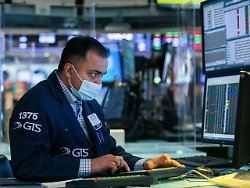Wednesday March 10, 2021
Interest rate rally hurts stocks
Investors must do that now
By Benjamin Feingold
The fear of interest rates is around the stock exchanges. Many investors fear a price slump like last year. However, there is no reason to panic.
It's been a year. In mid-March 2020, the corona crash reached its peak, the Dax temporarily fell below 9,000 points. In the meantime, the global stock markets have recovered very well from the sell-off – and are on a record course. Even if the Dax has been on the spot since December, the balance shows a solid plus of around 70 percent since the previous year's low.
And yet worries of another crash are mounting again, because interest rates are rising sharply on the bond market. We see rising returns above all in the US – and that's bad for the big US technology stocks. The reason: Rising bond yields increase financing costs for states and companies. Technology company stocks are particularly sensitive to higher financing costs. The consequence: For the long popular tech titles, things are going downhill after the Corona rally.
The situation is different in the eurozone: even the bonds of the heavily indebted peripheral countries have not come under pressure so far. From this side, the all-clear can therefore be given, the European stock markets are therefore still within reach of the highs that have often only recently improved. The European Central Bank (ECB) sees no need for action, and investors should also keep their feet still.
The situation on Wall Street is more difficult. At the beginning of August, less than 0.6 percent were called for the trend-setting ten-year US Treasuries, now there is already 1.6 percent. What is gradually developing into an interest rate alternative for investors at this level – although there is a dollar risk when buying US government bonds – means higher financing costs for companies. In the past, however, there was only a major correction when the central banks made their monetary policy more restrictive. There are currently no signs of such a turnaround, especially since the still rising inflation is seen by the monetary authorities as a temporary effect and therefore does not require any countermeasures.
Tech title under pressure
Rising interest rates currently have different effects on the stock market. While the cyclical stocks from the old economy and the corona losers such as travel companies or airlines are increasing due to the prospect of an end to the pandemic, the corona winners and the high-growth technology stocks are on the decline. The latter suffer particularly because the expected profits in the distant future are the price drivers here and these are lower in the present when interest rates rise. In addition, the companies usually have a higher level of debt, the upcoming refinancing will be more expensive. Hyped stocks like Tesla, Peloton and Zoom tumbled by 20 to 30 percent over a period of four weeks and are slowly reaching a level where bargain hunters can be active again.
Nothing has changed in terms of long-term trends, so there is no reason for investors to get nervous. Especially long-term investors who regularly invest in the stock market through ETF savings plans benefit now. Fluctuations on the stock exchanges are part of this and even help an ETF savings plan investor with the cost-average effect: when prices are high, fewer shares are purchased, and when prices are falling, the investor receives more shares for the same amount.
Thomas Meyer zu Drewer, Head of Public Sales at Lyxor ETF Germany, recommends staying calm and disciplined when it comes to savings plans: "The secrets of success behind ETF savings plans are regularity, low costs, the average cost effect and self-imposed savings discipline." In addition, ETFs allow a broad diversification in a market, which at the same time reduces the individual risk.
Nevertheless, investors should look specifically at the corona losers. Those who are not afraid of the risk can invest in restaurant operators, airlines, casinos, hotels or retailers in the USA, because there is a consumption boom there.
In technology stocks, however, industry rotation is likely to continue to create volatility. Discount certificates, which often have a better risk / reward ratio than a direct purchase of shares, benefit from this. For example, the discount certificate with WKN KB388A (Citigroup) with a term until mid-December 2021 offers a maximum return of almost 10 percent per year if the Nasdaq 100 does not trade below 12,500 points in December. The buffer until then is around three percent. Losses, which are smaller in the discount certificate than in the stock itself, arise if the Nasdaq collapses by 11 percent or more. An alternative is the comparable paper with the WKN SB2YG1 (Société Générale), which also runs until December 2021.
Benjamin Feingold operates the stock exchange portal Feingold Research.
This article does not constitute a recommendation to buy or sell individual stocks, ETFs, certificates or other investment products. No liability is assumed for the correctness of the data.
. (tagsToTranslate) economy (t) stock prices (t) inflation (t) interest rates
